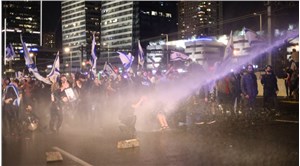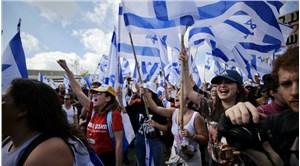Louis Fishman's interview with BirGün: Could Israel's massive protests lead to a new understanding?
Regarding judicial reform, as the 'finding a middle road' talks take place in Israel, mass protests keep going on too. Israelis wants more than just 'postponing'. Louis Fishman answers BirGün’s guestions on protests.
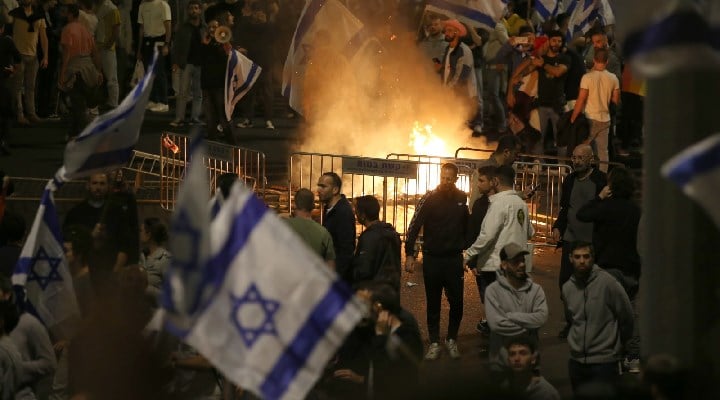
Çevrim ÇEVİREN
Hundreds of thousand of protestors in Israel took to the streets for the 13th week on Saturday. Prime Minister Benjamin Netanyahu delayed not only the juidicial reform plan but also firing Defence Minister Gallant. As BirGün, we asked writer-columnist and Brooklyn University’s Associate Prof Louis Fishman for his insights.
The eyes of the world were on France because of the protests. But last week, all heads turned to Israel instead. It took center stage. More than 600 thousand people went onto the streets. Unlike European protests, these have a political motivation. What’s your take on it?
First, Israel has been in an electoral crisis with five elections taking place in the last four years. It really became ridiculous, and the last government ended up falling, with Netanyahu being elected once again. When Netanyahu came to power, we knew that he already had a court case underway related to corruption and that one of the people he appointed as minister, Aryeh Deri had been convicted for corruption, something that the Israeli High Court rejected. Also, we had a few other new additions to the government, including extreme far-right parties, making it the most ultra-nationalist government Israel has ever seen. It’s important to understand the far right-wing parties are not the Hasidic ultra-Orthodox part of the government. However, what was clear was that many parts of his government had issues with the High Court, and without major legal reforms set against the court, they would be unable to rule freely.
To make things more complicated, as Netanyahu has a court case underway, he is not allowed to intervene in judicial affairs, thus he appointed a strong Justice Minister Yariv Levin. It is Levin’s judicial package, which is nothing less than a judicial coup, that has shaken everything up. This includes shifting how High Court judges are chosen, giving the government full powers in choosing the judges; and among other things, it also includes articles, giving the government the ability to overrule the High Court decisions with a narrow majority vote in the Knesset. In short, it is a judicial coup since if passed, the government would have absolute powers. Let’s be clear here, had the government merely wanted to implement reform, they would not have run into such major opposition, since many Israelis support reform.
Seeing the threat of this judicial package 12 weeks in a row, hundreds of thousands of people took to the streets. There were days when they brought the country to a near shutdown. It all came to a breaking point when the defense minister, Yoav Galant, a member of Netanyahu’s Likud, called on the Prime Minister to suspend the judicial package, with it tearing the country’s society apart. It took Netanyahu 24 hours to fire him, which led to an outpouring of spontaneous protests throughout the country. Clearly, things had gotten out of control, leading Netanyahu to suspend the legal reforms for about a month. Now the opposition parties are meeting with the government to try to reach a middle ground, under the auspices of the Israeli president, Isaac Herzog. Everything is on pause for now.
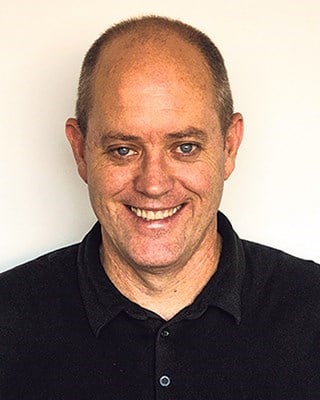
But there are still some protests going on. The interesting thing is that both left wing and right-wing went onto the streets. Can you tell us about the protestors’ profile?
Protestors are independent of the politicians. That’s important. I think that really is the strength of them. They are not waiting for the politicians to tell them what to do; rather they’re telling the politicians what to do. All the center parties… It’s the protestors who are setting the agenda. The far majority are center, with of course, leftists involved in them as well. However, most of them are mainstream. Some are calling this the protests of the social elite; for instance, leading the protests have been people from among the high-tech sector who, if the judicial reforms pass, threaten to pull their businesses out of the country. It’s also the Israeli Air Force’s reserve fighter pilots who are quite vocal, who have been opting out of their weekly training because they are joining the protests. They are academics and university students. In other words, this is not a social protest over inequalities within Israeli society. In fact, the protests have also succeeded in persuading some Likud members to join. Thus, this is not just a matter of 'right-vs-left', as well.
So, when I say elites, I mean the people that really are from the background of the original founders of the state. Remember Likud is also made of elites as well. For example, Tel Aviv is one of the most expensive cities to live in throughout the world, thus most of the protesters are middle and upper class. They include a large group of protesters from the LGBT community. This topic too is not one that divides the centre-left with Netanyahu’s Likud, which is also pro-LGBT. The Head of the Knesset is from Netanyahu’s party, is an openly a gay man and he has a partner with children. On the other hand, Netanyahu’s coalition is made of extremely homophobic far-right nationalists, which has sparked fears that if these reforms pass, it could go against the rights of the LGBT. So, many of the protesters are secular, liberal, centre-left leaning people.
They are the ones that carry the weight of burden within the state as well, doing army, and paying taxes. Keep in mind that for the most part, two of the parties within Netanyahu’s government are ultra-orthodox, and their children do not go to the army. In short, the protests are really over what kind of state do Israelis want, an open liberal society, or one that is much more connected to religious interference in the everyday life. Do we want a future right, conservative, pro-settlement society, or do we want an open, liberal and tolerant society? This is the point. And, unfortunately, as we will discuss later, the Palestinians, both citizens of the state and the ones under occupation, are mostly sidelined in the process.
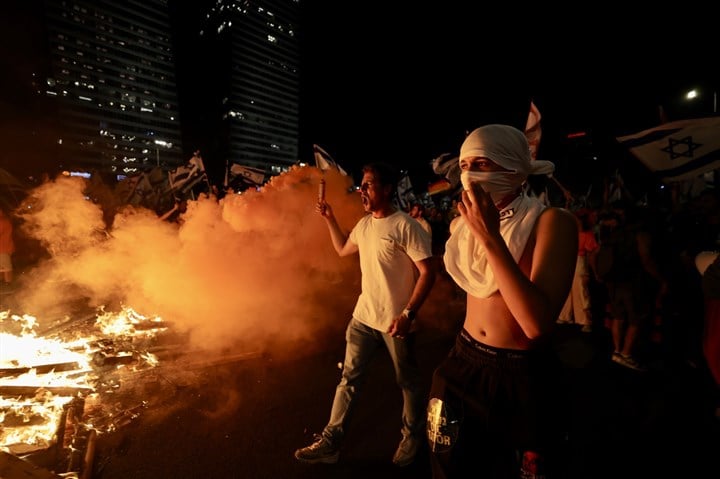
Do people see the effect of the right-wing parties of the coalition in their lives?
That’s exactly what they are afraid of.
Are they afraid of this for the future or are they really experiencing some pressure already in their lives now? Via the educational system for instance?
For the first time, they fear that this can happen. Remember, in the old system secular people were in control. Today’s Opposition was the establishment. Today’s Opposition was the country. Even during the years Netanyahu was prime minister, he never attempted to give so much power to religious groups or attempt to shift the balance of power in the state. They knew that courts are untouchable. I’ll give you an example. It’s a new law, that passed which dictates you can’t carry non-kosher food into hospitals during the Passover holiday. This includes Muslims and Christians, and of course non-religious Jews.
It’s completely ridiculous that you cannot bring bread to the hospital, for instance, during Passover. 20 percent of the country are Palestinian citizens of the state. They are doctors, they are nurses, they work at the hospitals. Why would one have to check their bag to see if they have non-Kosher food? Everyone should be free to do as they like, as it has been for the last 75 years. This is a small example, and it really does not affect most people. But they are testing how far they can go with this. On the flip side, many of the secular Israeli Jews are saying of this will not be an open liberal society, and if religious coercion continues, they will pick up and leave. One important rallying point in the demonstration are the protesters demanding a constitution as well.
Doesn’t Israel have a constitution?
No, it is like the UK. Israel doesn’t have a constitution. However, they do have 'basic laws', which enshrine civic freedoms. The debate over the constitution has been going on since the state's founding in 1948. However, with a High Court removed of all of its powers, many worry that the legal reforms can reverse basic human rights in country.
But I guess, they don’t want the constitution made by this coalition, right?
No, no. But this coalition never talks about the constitution because ultra-orthodox are against even the idea of a constitution. Their higher law is the Torah and religious law.
Are the Palestinians involved with the protests?
The fact that Israelis do not see the contradiction in ruling over Palestinians under occupation for 56 years and protesting for their rights, shows the limitations of these protests. However, clearly, if these judicial reforms pass, it will be the Palestinian citizens of the state who are going to suffer the most, not to mention those in the West Bank or Gaza. Let’s face it, if reforms do pass it will be those already oppressed who will suffer the most; and for the mainstream their lives will continue mostly normal. Yes, there will be more religion in the public sphere but the main victims will be Palestinians. Some Palestinian citizens of the state are participating, nonetheless. For example, supporters of the Hadash party are participating in the protests, with Jews and Arabs coming together. Thus, there certainly are leftists in the protests, and substantial groups from among the Jewish left that demand justice for Palestinians as well. However, it is hard to see them within the coverage, which tends more to cover the crowds within a sea of Israeli flags.
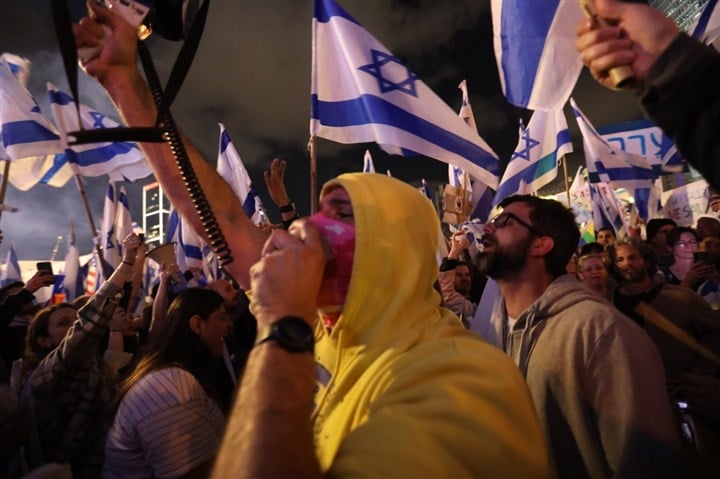
Is Hadash in the parliament?
They are in the parliament in a coalition with the Ahmad Tibi’s Ta’al party, but they were not part of the last government (when the opposition was in power) since they do not support in general Zionist parties. For them to join, the opposition would have needed to commit to peace talks and ending the occupation. One interesting phenomenon was during the first few weeks, Palestinian flags were being flown, with some protesters angry at the pro-peace groups waving them. This brings us to an important point, these protests could lead to a new understanding of what Israel is, and thus in the long run, lead to change in how the society understand the conflict with the Palestinians.
In Haaretz there was a comment saying that these are the protests for secularism, taking place for the first time for years. Do you agree?
Despite us speaking quite about secularism, overall, I think it’s less about this and more about, as I stated earlier, it is about what kind of Israel we want. It is about “do not step on my rights, do not oppress me.” Keep in mind, that the ultra-Orthodox are only one part of the coalition, they do not support the far-right nationalists and are also leaning more towards compromise. Netanyahu’s main goal is to somehow save himself from his own court case, or possible judicial rulings, and he is bringing the country down with him on the way.
Are the differences between ultra-Orthodox and secularist people very visible in everyday life? Do they interact with each other?
Keep in mind, Netanyahu himself is secular; the only time Israel had a religious prime minister was the last government, under Naftali Bennett, which represented most people involved in the current protests. The problem in Israel is when one group is given too much power. As I said earlier, the secular people rightly believe they carry the weight of the country. They are tired of being the ones who go to the army. They are tired of being the ones who pay highest taxes. Thus, it is important to remember that the source of the current protests are political, not about religion. It is about maintaining a status quo, while also protecting everyone’s rights. In the end, Israel is made up of many different sectors; secular, religious, ultra-orthodox, and a new growing ultra-nationalist fascist group represented by Itamar Ben-Gvir. Of course, within that there are %20 of Arabs. It is within this formula, Israeli politics carve out coalitions, and groups unify or separate.
What do you think is going to happen next then?
Right now, there is a sort of truce, a time out period. Tonight, we are seeing protests are continuing as well, despite this. This is going to a crucial month of talks, with the judicial package currently suspended in hopes of finding middle ground. What is clear is the protesters are in this for the long run and that they will do everything to stop it from becoming like Hungary, Poland, or what some say, Turkey.
Could Israel become Turkey?
It’s very different than the case in Turkey, but in the end it is about giving too much power to government, without proper checks and balances. It is about the rule of law, or the lack of it.
Do you think are there any similarities with Gezi protests that took place in Turkey?
I’ve been very careful not to compare the two since they are essentially very different even if both brought hundreds of thousands out to the streets. For example, the protests in Israel are much more structured, with speakers appearing. Still, both protests will be written into each countries’ history. Both are major turning points. Both also shows non-compromising leaders; if Erdoğan had said, “I hear you, this park will remain” who knows what would have happened? Currently I am exploring these ideas in a new book I am writing on the period. I might add that while both societies are similar in many ways, Turkey has a greater history of protests and resistance; for example, even if women are taking a major role in Israel’s protests, the history of women and protests in both countries are strikingly different.
How does it feel to be away from your country when the country is at a watershed moment?
Most American Jews have never been to Israel. They have never even visited Israel. They might show solidarity with Israel. For me personally, because I’m an Israeli citizen, and I lived there when I was young and invested my life there, and because I have close family there, it is my home and it’s been very hard to be away. But the only time I felt I had to be there was when Rabin was assassinated. I might add that by living years in Turkey as well, I have gained experiences from which I can compare and broaden my understanding of what 'home' means, which includes my life in New York. All of this gives me a unique experience and a window to understand each society. At the start of these protests, I was a bit cynical due to its inability to include Palestinians. As the protest continued, I started to understand better, that my voice also had to be raised. However, I will continue to say that democracy doesn’t start and end with Jews, it has to extend to Palestinians. If it doesn’t, then it is not a full protest.




